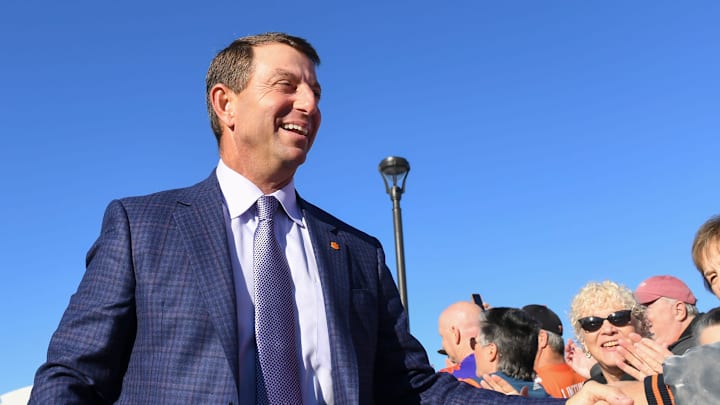When Swinney used the word “pay” while discussing players, reporters jumped. He quickly clarified his language — and his long-held stance.
“Yeah, and you, as RevShare, that’s what we have,” he said. “You have to pay — it’s RevShare. You should pay.”
He pushed back on the idea that he’d vowed never to pay players.
“I never said that,” Swinney responded. “I said I’m against professionalizing college athletics, where we… [just have] pro football.”
Why He Says This Isn’t “Just Pro Football”
Swinney’s line in the sand isn’t about money existing in college football; it’s about what he believes makes it college football in the first place.
“That’s not the case,” he said of the idea that NIL has fully professionalized the sport. “These kids go to school, they have to go to school, they have to qualify, they have to take tests, they have degree completion percentages that they have to make. They have to pass a certain amount of [hours]. Those things are real.”
For him, that academic structure is the difference.
“These are student-athletes,” Swinney said. “Their opportunity is different, their scholarship’s different, their RevShare, all those things are great. Those things are great, but they’re not… it’s not just a professional contract and just show up and play football.”
He added, “They’ve got to… there’s a lot that they have to do as college athletes. That hasn’t changed at all.”
How NIL and Rev Share Fit Clemson’s Model
Within that framework, Swinney’s message was that Clemson can embrace revenue sharing — as long as the core of the program remains about education, development and structure.
“Their opportunity is different,” he said. “Their scholarship’s different, their RevShare… [but] those things are great.”
He sees the new regulatory body and the evolving rules as still a work in progress but trending in a better direction than the free-for-all of the early NIL years.
“We’re not there,” Swinney said. “We’re probably a year or so away from a little bit more order, but it’s way better right now than it was last year or two years ago, three years ago. At least from a structure standpoint.”
